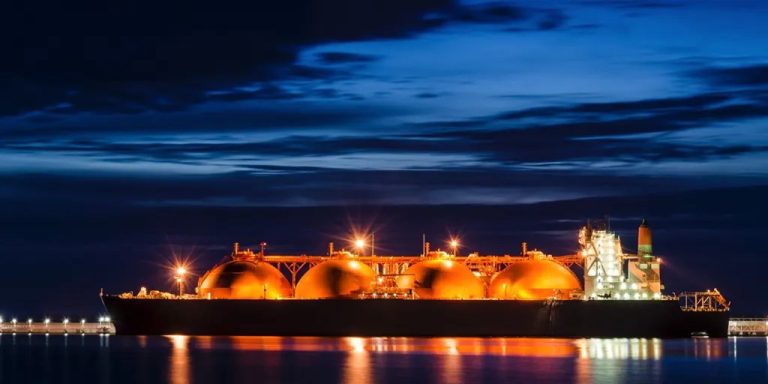From the Daily Caller

Nick Pope
Contributor
Existing data and recent history contradict one of the key points of the Biden administration's long-awaited liquefied natural gas (LNG) export study, which Energy Secretary Jennifer Granholm is trying to turn into fact. .
The Department of Energy (DOE) released the study on Tuesday, nearly a year after the Biden administration froze approvals for LNG exports to non-free-trade countries in January. The paper does not establish that more LNG export capacity is not in the public interest, but it does suggest that a significant increase in exports would push up domestic gas prices, despite all available evidence to the contrary.
“New DOE research finds that numerous domestic natural gas consumers, from households to farmers to heavy industry, will face higher prices as a result of increased exports,” Granholm said in a statement responding to the agency's report. “Research presented today finds that unrestricted LNG exports would increase domestic wholesale natural gas prices by more than 30%. By 2050, unrestricted LNG exports would increase costs for the average American household by more than $100 per year. (Related: 'This is hilarious': Energy Secretary Cax when asked about rising gas prices)
Before the Biden administration. Following this week's decision to delay approval of the massive CP2 liquefied natural gas export terminal, White House officials met with a 25-year-old TikTok influencer who has launched an online campaign to kill the project.
through @DailyCaller News Foundation https://t.co/UW6dVVgaS5
— Nick Pope (@realnickpope) January 25, 2024
The study released this week is not the first DOE publication to show that growth in LNG exports could lead to higher domestic prices: In 2012, the agency's Energy Information Administration also predicted that wellhead prices, or natural gas prices, could rise54 %. According to data analysis by the Chamber of Commerce, U.S. LNG exports have accelerated significantly from 2012 to the present, but as export volumes have increased significantly, domestic natural gas prices have fallen.
The shale revolution of the late 2000s and early 2010s spurred massive growth in the U.S. natural gas industry, but U.S. LNG exports were largely a non-factor until 2016, according to the Center for Strategic and International Studies. Today, the United States is the world's leading LNG exporter and is on track to roughly double the LNG export capacity of Qatar, the world's second-largest exporter, by 2028.
In her assessment of the DOE's LNG study, Granholm actually acknowledged that increased exports do not mean higher domestic prices, writing: “So far, U.S. consumers and businesses have benefited more than the rest of the world.” They face greater price volatility amid relatively stable domestic natural gas prices. In fact, Granholm said that during the same period that the U.S. LNG industry developed into a global leader, U.S. natural gas prices remained “relatively stable.”
David Blackmon, a 40-year oil and gas industry veteran, spoke to Granholm about how increased exports could lead to higher domestic prices. “This is nonsense.”
Granholm also presided over a period of rising U.S. energy costs that energy market analysts such as Travis Fisher, director of energy and environmental policy research at the Cato Institute, attributed to the Biden administration's more than $1 trillion The dollar’s green energy and climate policy agenda.
“Granholm's letter and its leak to the New York Times is a cynical and transparent attempt to substantiate the findings of the study, which in fact proves that the LNG export business is Continued growth is in the national interest. “This kind of political game is typical of the entire Biden presidency, and it may help Donald Trump get re-elected. The public is tired of all this nonsense.
On the same day the DOE released its report, S&P Global released its own study on the long-term growth implications of U.S. LNG exports. Analysis by Standard & Poor's found that domestic natural gas prices have not risen despite a surge in exports, and that the LNG industry has the potential to contribute $1.3 trillion to U.S. GDP in 2040, in addition to generating huge tax revenues for the state treasury.
Still, Granholm argued in her assessment that her agency's recent “publications reinforce that a business-as-usual approach is neither sustainable nor desirable.”
In terms of sustainability, analysts believe that U.S. LNG is cleaner than gas from Russia, Qatar and most other places, and has huge potential to replace more polluting fuels such as coal in other countries, thus vis-à-vis the “business model” Reduce emissions.
As for whether expanding LNG export capacity is “desirable,” particularly for investors and developers, Blackmon said it's not the government's responsibility to decide what private investments are “desirable” or “not.” Instead, it is the private sector's responsibility to determine which investments make sense and which investments do not, with those who read the market correctly benefiting from it and those who make poor investment decisions suffering the consequences of those choices.
“Not only was this not Granholm's work, the findings in the report released Tuesday simply do not support any such conclusion,” Blackmon said.
The U.S. Department of Energy did not immediately respond to a request for comment.
All content created by the Daily Caller News Foundation, an independent, nonpartisan newswire service, is free and available to any legitimate news publisher that can deliver a large audience. All republished articles must include our logo, the reporter's byline, and their DCNF affiliation. If you have any questions about our guidelines or working with us, please contact licensing@dailycallernewsfoundation.org.
Relevant
Learn more from Watts Up With That?
Subscribe to have the latest posts delivered to your email.
